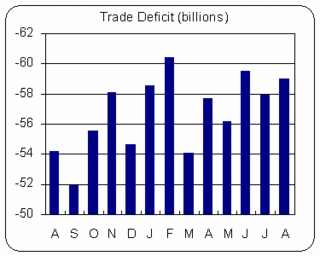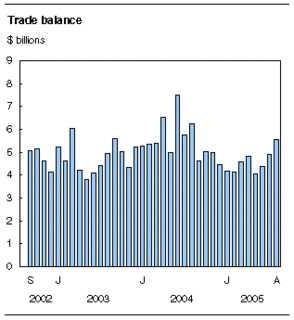Friday, October 14, 2005
The tale of two economies - someone tell Bush the arrows should go up, not down
United States
 The United States trade deficit widened 1.8% in August to its third-highest level on record as oil import prices hit a new high and imports of textiles and other goods from China set a record.
The United States trade deficit widened 1.8% in August to its third-highest level on record as oil import prices hit a new high and imports of textiles and other goods from China set a record.
The August trade gap totaled $59 billion, slightly below a median $59.5 billion estimated by economists before the report. Record imports of $167.2 billion easily overwhelmed record exports of $108.2 billion.
Oil import prices increased for the third consecutive month to a record $52.65 a barrel, lifting imports from OPEC countries to a record $11.9 billion. Overall crude oil imports were $17.2 billion in August, also a record.
The report showed little impact from Hurricane Katrina, which forced the temporary closure of the Port of New Orleans after it hit on Aug. 29. The Commerce Department will publish preliminary September trade data on Oct. 21 for Gulf ports.
On the employment front, however, the story is different. The number of people who have lost their jobs because of Hurricanes Katrina and Rita jumped to 438,000 last week as the economic shockwaves from the nation's costliest natural disaster continued to be felt six weeks after Katrina hit. The United States Labor Department reported that an additional 75,000 hurricane-related claims were filed last week.
On the home front, the news is starting to turn sour. Rates on 30-year mortgages rose for a fifth consecutive week, topping 6% for the first time since March as financial markets continued to worry about inflation. Mortgage giant Freddie Mac reported Thursday that the nationwide average for 30-year, fixed-rate mortgages rose this week to 6.03%, the first time the rate has been above 6% since it hit 6.04% in the last week in March. It was 5.98% last week.
Analysts said that the surge in energy costs following hurricane-related production shutdowns along the Gulf Coast has sparked fears in financial markets of higher inflation.
"The most likely pattern is for mortgage rates to gradually rise over time. It is likely that they'll hover at 6% or just a bit over," said Frank Nothaft, chief economist at Freddie Mac. He added that "will translate into somewhat weaker demand for housing, lower home sales volume and lower house price growth."
Canada
 Canada's merchandise exports to the world increased for the sixth time in the last eight months in August, thanks in large part to soaring natural gas prices.
Canada's merchandise exports to the world increased for the sixth time in the last eight months in August, thanks in large part to soaring natural gas prices.
Energy imports also jumped to reach a record high of $3.0 billion as demand for gasoline peaked in August.
In total, Canadian companies exported merchandise worth nearly $38.0 billion, a 1.5% increase from July. On the other hand, imports slipped 0.4% to just over $32.4 billion as the rise in energy imports failed to offset declines in all other sectors.
That left Canada's trade surplus with the world at nearly $5.6 billion, up from a revised $4.9 billion in July. The trade surplus with the United States rose to nearly $8.9 billion while the trade deficit with countries other than the United States narrowed to $3.3 billion.
On the employment front, the numbers are moving in the right direction despite a strong dollar and weakened manufactoring sector. There is by no means equity across the country as Alberta, BC and most parts in the west are fuelling the growth, but they are moving the national numbers.
Employment was unchanged in September, leaving total gains during the third quarter at 31,000 (+0.2%). This was lower than the second quarter job growth of 0.5% (+79,000). The unemployment rate remained among the lowest in almost three decades, edging down 0.1 percentage points in September to 6.7%.
All of the 135,000 (+0.8%) job gains observed so far in 2005 have been in full-time employment and the number of hours worked over the same nine-month period has increased by 0.9%. On average, Canadians worked 33.4 hours per week in September, up nearly one-half hour compared to two years ago when hours worked started its upward trend.
Average hourly wages of employees have risen by 3.8% over the past 12 months, with the sharpest increases in natural resources and in professional, scientific and technical services. In comparison, the year-over-year increase for all goods and services in the Consumer Price Index (CPI) basket was 2.6% in August.
On the home front, new housing prices climbed 0.4% compared to July, while the 12-month rate of increase slipped to 4.6% from 4.7% in July.
An active market for new housing, along with higher prices for building materials and labour, continued to elevate prices at the national level. Land value increases were a contributing factor in 10 of the 21 metropolitan areas surveyed. Land shortages were specified in Hamilton and Victoria.
According to the New Housing Price Index (which is based on contractors' selling prices of new homes in 21 metropolitan areas), the price of new homes rose 0.4% on a monthly basis, up from the 0.2% increase in July.
Also, contractors took out their highest level of building permits on record in August as investment intentions by governments and businesses went through the roof.
Municipalities issued a record $5.4 billion in building permits, a 10.2% increase from July. It broke the previous monthly record of $5.3 billion set in June 2004.
 The United States trade deficit widened 1.8% in August to its third-highest level on record as oil import prices hit a new high and imports of textiles and other goods from China set a record.
The United States trade deficit widened 1.8% in August to its third-highest level on record as oil import prices hit a new high and imports of textiles and other goods from China set a record.The August trade gap totaled $59 billion, slightly below a median $59.5 billion estimated by economists before the report. Record imports of $167.2 billion easily overwhelmed record exports of $108.2 billion.
Oil import prices increased for the third consecutive month to a record $52.65 a barrel, lifting imports from OPEC countries to a record $11.9 billion. Overall crude oil imports were $17.2 billion in August, also a record.
The report showed little impact from Hurricane Katrina, which forced the temporary closure of the Port of New Orleans after it hit on Aug. 29. The Commerce Department will publish preliminary September trade data on Oct. 21 for Gulf ports.
On the employment front, however, the story is different. The number of people who have lost their jobs because of Hurricanes Katrina and Rita jumped to 438,000 last week as the economic shockwaves from the nation's costliest natural disaster continued to be felt six weeks after Katrina hit. The United States Labor Department reported that an additional 75,000 hurricane-related claims were filed last week.
On the home front, the news is starting to turn sour. Rates on 30-year mortgages rose for a fifth consecutive week, topping 6% for the first time since March as financial markets continued to worry about inflation. Mortgage giant Freddie Mac reported Thursday that the nationwide average for 30-year, fixed-rate mortgages rose this week to 6.03%, the first time the rate has been above 6% since it hit 6.04% in the last week in March. It was 5.98% last week.
Analysts said that the surge in energy costs following hurricane-related production shutdowns along the Gulf Coast has sparked fears in financial markets of higher inflation.
"The most likely pattern is for mortgage rates to gradually rise over time. It is likely that they'll hover at 6% or just a bit over," said Frank Nothaft, chief economist at Freddie Mac. He added that "will translate into somewhat weaker demand for housing, lower home sales volume and lower house price growth."
Canada
 Canada's merchandise exports to the world increased for the sixth time in the last eight months in August, thanks in large part to soaring natural gas prices.
Canada's merchandise exports to the world increased for the sixth time in the last eight months in August, thanks in large part to soaring natural gas prices.Energy imports also jumped to reach a record high of $3.0 billion as demand for gasoline peaked in August.
In total, Canadian companies exported merchandise worth nearly $38.0 billion, a 1.5% increase from July. On the other hand, imports slipped 0.4% to just over $32.4 billion as the rise in energy imports failed to offset declines in all other sectors.
That left Canada's trade surplus with the world at nearly $5.6 billion, up from a revised $4.9 billion in July. The trade surplus with the United States rose to nearly $8.9 billion while the trade deficit with countries other than the United States narrowed to $3.3 billion.
On the employment front, the numbers are moving in the right direction despite a strong dollar and weakened manufactoring sector. There is by no means equity across the country as Alberta, BC and most parts in the west are fuelling the growth, but they are moving the national numbers.
Employment was unchanged in September, leaving total gains during the third quarter at 31,000 (+0.2%). This was lower than the second quarter job growth of 0.5% (+79,000). The unemployment rate remained among the lowest in almost three decades, edging down 0.1 percentage points in September to 6.7%.
All of the 135,000 (+0.8%) job gains observed so far in 2005 have been in full-time employment and the number of hours worked over the same nine-month period has increased by 0.9%. On average, Canadians worked 33.4 hours per week in September, up nearly one-half hour compared to two years ago when hours worked started its upward trend.
Average hourly wages of employees have risen by 3.8% over the past 12 months, with the sharpest increases in natural resources and in professional, scientific and technical services. In comparison, the year-over-year increase for all goods and services in the Consumer Price Index (CPI) basket was 2.6% in August.
On the home front, new housing prices climbed 0.4% compared to July, while the 12-month rate of increase slipped to 4.6% from 4.7% in July.
An active market for new housing, along with higher prices for building materials and labour, continued to elevate prices at the national level. Land value increases were a contributing factor in 10 of the 21 metropolitan areas surveyed. Land shortages were specified in Hamilton and Victoria.
According to the New Housing Price Index (which is based on contractors' selling prices of new homes in 21 metropolitan areas), the price of new homes rose 0.4% on a monthly basis, up from the 0.2% increase in July.
Also, contractors took out their highest level of building permits on record in August as investment intentions by governments and businesses went through the roof.
Municipalities issued a record $5.4 billion in building permits, a 10.2% increase from July. It broke the previous monthly record of $5.3 billion set in June 2004.